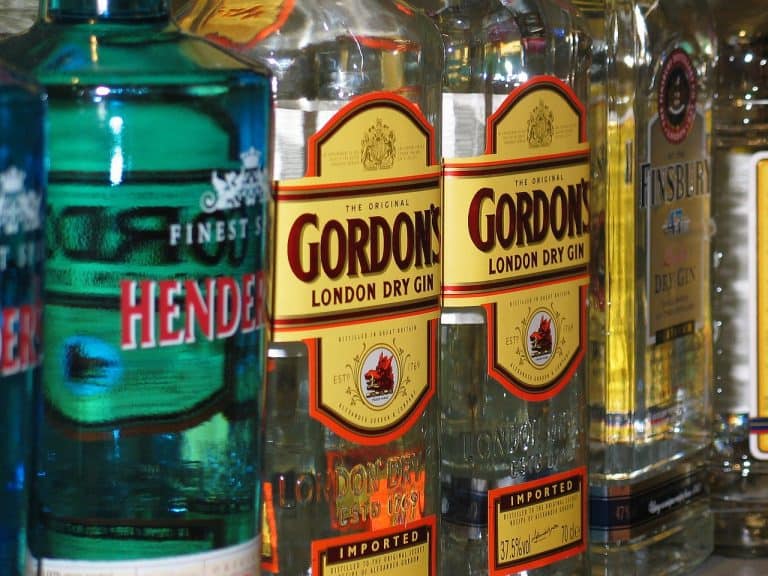Can Gin Go In The Freezer?
There are not a lot of drinks that are just as refreshing as a gin mixed with something. Gin is consumed best when it’s freezing cold, which may get you thinking… can gin go in the freezer?
Your bottle of gin can for sure go in the freezer. Gin is best served really cold, so storing it in the freezer is an easy way to do that. Gin also has an Alcohol by Volume (ABV) of more than 37.5% which makes it unable to freeze solid.
An already opened bottle of gin is especially best stored in a cold place. But in some cases, it might not be best to store it in the freezer.
In this article, we’ll discuss if and when you should keep your bottle of gin in the freezer.
Should You Store Gin In The Freezer?
Drinking a cold gin and tonic on a hot summer day is a great way to cool off and freshen up. On top of that, reducing the temperature in gin helps soften the alcohol perception which is why gin is best served cold.
This is why you should consider keeping your bottle of gin in the freezer before drinking it. Be sure to put the bottle in the freezer well in time before you drink it of course.
If you have no more room in your freezer, then storing it in a fridge is also a great way to serve your gin cool. Cooling down a bottle of gin in a fridge does however take even more time than in a freezer of course so it might not always be the best option.
Let’s say you’re not able to cool down your gin in the freezer or fridge before you drink it. Then you can of course also serve your room temperature gin with ice to cool the drink.
The downside to this is that the ice in your drink will melt quickly and in turn water down your drink a bit. Watering down your drink leads to a diluted flavor.
That’s why storing your gin in a fridge or freezer is always preferred if you want to serve your drink cold.
When you come across an old, opened bottle of gin, you should consider not putting it in the freezer. Don’t worry, your gin won’t spoil if you do decide to put it in the freezer, but in some cases, there could be some downsides to storing gin in a freezer.
Normally gin will not freeze due to the high ABV of 37.5%, but an opened bottle of gin might have gotten a lower percentage of ABV over time.
When an opened bottle of gin is stored in a warmer place, some of the alcohol in the bottle might evaporate. When some of the alcohol evaporates, the ABV gets lower which might cause the drink to freeze or at least get a bit slushy in the freezer.
Randomly finding an old bottle of gin is of course amazing. But it’s probably best to check if it has already been opened before you throw it in the freezer.
If you do come across an old already opened bottle of gin, it might be best to store it in a fridge instead of a freezer before you drink it.
Is It Bad To Store Gin In A Normal Cabinet?

What if you don’t have enough room in your fridge or freezer for a bottle of gin?
Sometimes the space in your fridge and/or freezer is all needed for food or you just might not have a big enough freezer to store alcohol all the time. Can’t you just store it in a cabinet in your kitchen somewhere?
Most people have some kind of cupboard or cabinet in their house for all their bottles of alcohol.
A lot of people probably always store their gin inside a cabinet like that. Is there a problem with keeping gin at room temperature? You might wonder if gin will go bad if it’s not kept in cool spaces.
If you don’t plan on opening your bottle of gin anytime soon, it’s not a problem to store it somewhere other than in a fridge or freezer. Due to the high ABV of at least 37.5%, your gin won’t go bad over time.
As long as you store it in a dark and moderate spot (about room temperature), you can store it anywhere you like. Sunlight and warmth won’t make the gin go bad, there’s enough alcohol in the bottle to prevent that.
They can however change the taste of your gin so beware of that. Sunlight and warmth can for instance cause some of the alcohol to evaporate, which will make the gin less strong.
They can also damage the chemicals of the botanicals in a gin which normally gives its unique flavors. Once these chemicals are damaged, you might not experience the gin like it is supposed to taste, which is of course not ideal.
If you just opened a bottle of gin and you need to store it for another time, then it is best to keep it in a fridge or freezer. You can, however, also store it outside of a fridge or freezer because the gin won’t necessarily go bad.
Once opened though, the alcohol does evaporate a bit quicker if it’s stored in warmer places. It’s best to finish an opened bottle within a year. This way the taste will stay mostly the same.
Other Reasons To Not Store Gin In A Freezer Or Fridge
Storing your gin in a fridge or freezer is also a matter of personal preference. Like we said before in this article, gin is mostly preferred cold. Everyone’s taste is different, however, so who knows, maybe a gin at room temperature is the way to go for you.
If you’re not sure which you like more, you can try experimenting with it and try both ice-cold gin and gin at room temperature. Some people actually like drinking gin at room temperature more than drinking it fresh out of the freezer.
It also depends a bit on which cocktail you’re planning on making with your gin. There are a lot of options where ice-cold gin is preferred, but it might surprise you how many gin cocktails there are that are supposed to be warm or even hot.
To give you an idea of some warm gin cocktails:
- Hot Gin Toddy
- Mulled Sloe Gin
- Yuletide Gin Flip
- Hackney Homebrew
- Hot Spiced Gin & Ginger
- White Chocolate Gin Flip
Final Thoughts
Gin can go in the freezer if you want to store it or simply cool it down quickly before you drink it. However, you don’t necessarily need to store your gin in a fridge or freezer to preserve your drink, because it will most likely never spoil.
As long as you keep your bottle away from too much sunlight and warmth the taste of your gin will also pretty much stay the same, no matter how long you store it.
But, to come back to the original question; Yes, you can store gin in your freezer. It’s even recommended, but not a necessity.






